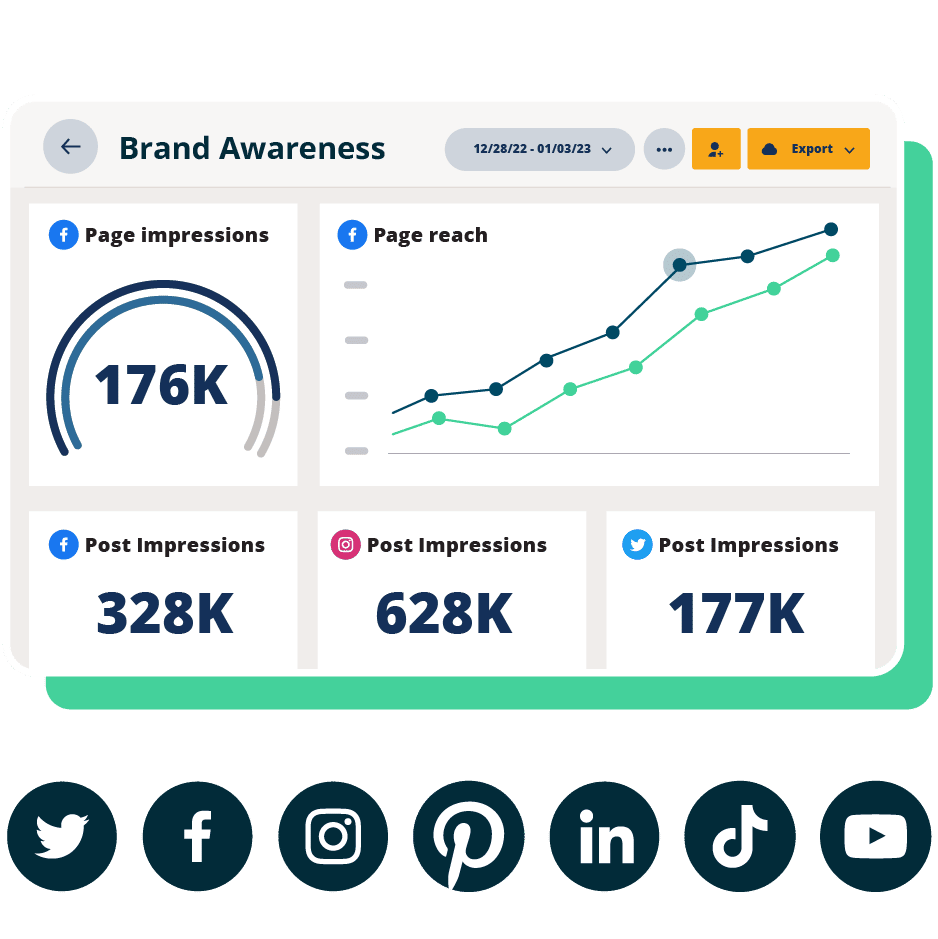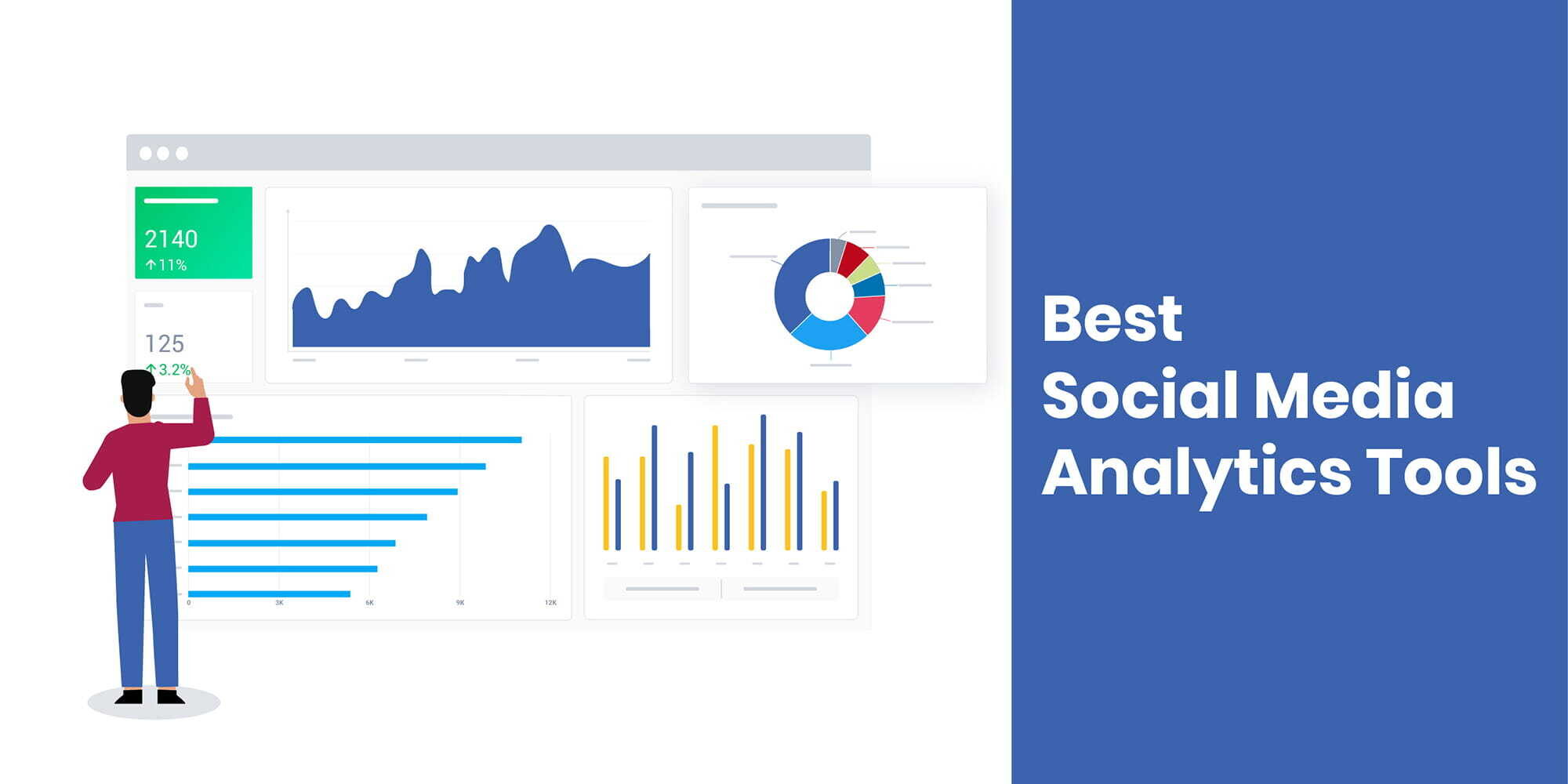In the modern era of technology, social media has evolved to become an essential component of our daily existence. It has not only transformed the way we connect and share information but has also become a powerful marketing tool for businesses. As brands strive to establish a strong online presence, they must leverage the power of social media analytics to gain valuable insights and optimize their strategies. In this article, we will explore the world of social media analytics for brands.
Understanding Social Media Analytics For Brands

Definition and Importance
Social media analytics refers to the process of gathering and analyzing data from social media platforms to extract meaningful insights. It enables brands to understand the impact of their social media efforts, identify trends, and optimize their strategies. With billions of users active on social media, brands can tap into this vast pool of data to gain a deeper understanding of their target audience and refine their marketing approach.
Types of Social Media Analytics
There are several types of social media analytics that brands can utilize to gain insights and improve their performance. These include:
- Descriptive Analytics: This type of analytics focuses on summarizing historical data, providing insights into past performance and trends.
- Diagnostic Analytics: Diagnostic analytics helps brands understand why certain events occurred, identifying the factors that influenced their social media performance.
- Predictive Analytics: By analyzing historical data, predictive analytics helps brands forecast future trends and outcomes, enabling them to make proactive decisions.
- Prescriptive Analytics: Prescriptive analytics takes predictive analytics a step further by recommending actions and strategies to achieve desired outcomes.
Benefits of Social Media Analytics for Brands
Social media analytics offers numerous benefits for brands looking to optimize their online presence and engagement. Let’s explore some of these benefits in detail.
Tracking Performance and Engagement
- One of the primary benefits of social media analytics is the ability to track and measure the performance of social media campaigns. Brands can monitor key metrics such as reach, impressions, likes, shares, comments, and click-through rates to assess the effectiveness of their content and engagement strategies. This data helps brands identify what works and what doesn’t, allowing them to make informed decisions and improve their social media performance.
Customer Insights and Market Research
- Social media analytics provides brands with valuable customer insights and market research data. By analyzing social media conversations, sentiment analysis, and demographic information, brands can gain a deeper understanding of their target audience. They can identify customer preferences, interests, and pain points, enabling them to create more targeted and personalized marketing campaigns. Social media analytics also helps brands identify emerging trends and stay ahead of their competitors.
Competitor Analysis
- Social listening analytics allows brands to monitor and analyze their competitors’ social media activities. By tracking their competitors’ content, engagement metrics, and audience sentiment, brands can identify gaps in the market and discover growth opportunities. This information can be used to refine their strategies, differentiate their brand, and gain a competitive advantage.
Key Metrics in Social Media Analytics
To effectively measure and analyze social media performance, brands should focus on key metrics that align with their marketing goals. Here are some essential metrics to consider:
Reach and Impressions
- Reach refers to the total number of unique users who have seen a particular piece of content, while impressions represent the total number of times that content has been displayed. These metrics help brands understand the visibility and potential audience size of their social media campaigns.
Engagement Metrics
- Engagement metrics measure the level of audience interaction with a brand’s social media content. These metrics include likes, comments, shares, retweets, and mentions. Higher engagement indicates a more active and involved audience, suggesting that the brand’s content is resonating with its followers.
Conversion and Sales Tracking
- Tracking conversions and sales is crucial for brands looking to measure the effectiveness of their social media campaigns. By implementing conversion tracking tools, brands can attribute specific actions, such as purchases or sign-ups, to their social media efforts. This data enables brands to assess the ROI of their social media marketing and optimize their strategies accordingly.
Tools for Social Media Analytics

Several tools and platforms are available to help brands effectively analyze their social media data. Here are a few popular options:
Google Analytics
Google Analytics provides in-depth insights into website traffic, including the ability to track social media referrals. It allows brands to analyze user behavior, identify the source of traffic, and measure conversions originating from social media platforms.
Social Media Management Platforms
Social media management platforms, such as Hootsuite and Sprout Social, offer built-in analytics features that allow brands to monitor and analyze their social media performance. These platforms provide a centralized dashboard where brands can track key metrics, schedule posts, and engage with their audience.
Third-Party Analytics Tools
In addition to built-in analytics features, brands can also leverage third-party tools like Brandwatch, AIM Insights, or Buffer Analyze for more advanced social media analytics. These tools offer comprehensive data analysis, sentiment analysis, competitive benchmarking, and custom reporting.
Best Practices for Social Media Analytics
To make the most of social media analytics, brands should follow some best practices. Here are a few recommendations:
Setting Clear Goals and Objectives
- Before diving into social listening analytics, brands must establish clear goals and objectives. Whether it’s increasing brand awareness, driving website traffic, or boosting conversions, having well-defined goals will help guide the analytics process and ensure that efforts are aligned with desired outcomes.
Monitoring Relevant Metrics
- While it’s important to monitor various metrics, it’s equally essential to focus on those that are most relevant to the brand’s goals. By identifying and tracking key metrics, brands can gain actionable insights and measure their progress effectively.
Analyzing Data and Drawing Insights
- Collecting data is just the first step; brands must analyze the data and draw meaningful insights from it. By identifying patterns, trends, and correlations in the data, brands can uncover valuable insights that can inform their marketing strategies and decision-making.
Making Data-Driven Decisions
- Social listening analytics provides brands with a wealth of information, but it’s crucial to translate that data into actionable decisions. Brands should use the insights gained from analytics to optimize their social media strategies, refine their content, and allocate resources effectively.
Case Studies with Record-Breaking Success
To truly grasp the power of social media analytics, let’s look at some notable case studies where brands have leveraged data to achieve remarkable results.
Nike’s “Dream Crazy” Campaign
In 2018, Nike launched the “Dream Crazy” campaign featuring Colin Kaepernick, which sparked widespread conversation on social media. Using advanced social media analytics, Nike was able to monitor audience sentiment, engagement, and the global reach of the campaign in real-time. Despite initial backlash, the brand reported a 31% increase in online sales within just a few days of the campaign’s release. By closely tracking sentiment shifts and engagement spikes, Nike was able to adjust their social media strategy and messaging to enhance brand loyalty and capitalize on the viral moment.
Spotify’s Yearly Wrapped Campaign
Spotify’s annual Wrapped campaign is a brilliant example of using social media data to create personalized experiences. Through social listening and user engagement data, Spotify curates individual playlists based on user behavior throughout the year. This data-driven approach has resulted in massive user engagement on platforms like Twitter and Instagram, with millions of users sharing their personalized Wrapped stories. In 2022, Wrapped generated over 60 million shares across social media, significantly boosting Spotify’s brand visibility and customer loyalty.
Coca-Cola’s #ShareACoke Campaign
Coca-Cola’s #ShareACoke campaign is another great example of using social media analytics to track and optimize engagement. By analyzing the performance of personalized Coke bottles with names on them, the company noted an increase in consumer interaction and sentiment online. The campaign saw 998 million Twitter impressions and helped Coca-Cola grow sales in 17 out of its 20 key markets.
Case Study: How Social Media Analytics Transformed Nike’s and Spotify’s Campaigns
Nike’s “Dream Crazy” Campaign: Data-Powered Bravery
Nike’s “Dream Crazy” campaign, launched in 2018. This campaign was facing many different opinions from the target audience. So Nike decided to focus on the data and insights from social media analytics. To be able to find more rich insights to be able to make more success.
-
Real-Time Sentiment Analysis:
- Nike used the sentiment analysis feature, to analyze the audience opinions across the different social media platforms.
- The changes in the audience sentiment through the campaign helped Nike to send the right messages. Turning all the negative sentiments into positive ones.
-
Engagement Metrics:
- Nike tracked the different engagement metrics for each platform, including likes, comments, and shares.
- The campaign gained over 170,000 mentions across social media platforms with the hashtag “Dream Crazy”. Leading to an increase be 30% in the online sales in the first week.
-
Demographic Insights:
- The insights provided the demographic insights for the audiences that engaged with the campaign. Which helped to create better messages to more segments through the campaign.
Results
- Sales Impact: they had a 30% increase in online sales in the first week of the campaign. And it increased to reach 45% increase in the end.
- Brand Loyalty: Nike’s brand name was strengthened within the campaign, leading to an increase in loyal customers.
- Engagement: the organic engagement was increased, through having millions of conversations on Nike’s social media pages.
Spotify’s “Wrapped” Campaign: Personalization at Scale
Spotify’s annual “Wrapped” campaign uses data to create personalized playlists and insights for users. Through mentioning the individual music test and habits with the year. To create better playlists and provide them at the right time for each user.
-
User Behavior Analytics:
- Spotify used its internal insights about its users and their listening habits. To gather data about their preferred song, types of music, listening times, and time spent on the app.
- These insights were customized for each user in the “Wrapped” campaign to match his interest and encourage the use of the app.
-
Social Listening:
- Spotify monitored the campaign and its popularity across the different social media platforms. And the amount of user-generated content that is related to the campaign.
- The insights showed the enjoyment of the campaign by the users through sharing it. To present their music test with friends and find the common between each other.
-
Trend Identification:
- By tracking the campaign hashtags by the users, Spotify guarantees the effectiveness of the campaign during its run.
Results
- Virality: the campaign gained over 60 million shares by the users across the different social media platforms during its run duration.
- User Retention: Spotify users showed their interest in the campaign, and resubscribed in the app after the campaign.
- Global Visibility: Spotify’s name went viral during the campaign, reaching a new target segment.
Influencers Weigh In: Quotes and Tweets
Influencers play a key role in social media strategy. Here are some tweets and quotes from industry leaders who emphasize the importance of analytics in successful campaigns:
- Gary Vaynerchuk (@garyvee): “Without data, you’re just another person with an opinion. Analytics will tell you what your audience really cares about—so you can give them more of it!”
- Neil Patel (@neilpatel): “The brands that win on social are the ones using data, not gut instinct. Social media analytics takes the guesswork out of your campaigns.”
- Ann Handley (@MarketingProfs): “Social media analytics is the modern marketer’s best friend. It turns likes, shares, and tweets into actionable insights that drive ROI.”
Conclusion
Social listening analytics is a powerful tool for brands looking to optimize their online presence, engage with their audience, and achieve their marketing goals. By understanding the significance of social media analytics, leveraging key metrics, and using the right tools, brands can make data-driven decisions and stay ahead in an increasingly competitive digital landscape. With the future trends in social media analytics, brands can expect even more advanced capabilities to gain deeper insights into their audience and refine their strategies.
If you’re ready to take your social media analytics to the next level and unlock the full potential of your brand’s online presence, request a demo from AIM Technologies today. Our cutting-edge analytics platform will empower you with comprehensive insights and actionable data to supercharge your social media strategies.
FAQs
1. What is social media analytics?
- Social media analytics refers to the process of collecting and analyzing data from social media platforms to gain insights into audience behavior, campaign performance, and market trends.
2. Why is social media analytics important for brands?
- Social listening analytics helps brands understand their audience, measure the effectiveness of their campaigns, gain customer insights, and identify market trends. It enables brands to make data-driven decisions and optimize their social media strategies.
3. What metrics should brands focus on in social media analytics?
- Brands should focus on metrics such as reach, impressions, engagement (likes, comments, shares), conversions, and sales tracking. These metrics provide valuable insights into the performance and impact of social media efforts.
4. What tools can brands use for social media analytics?
Popular tools for social media analytics include Google Analytics, social media management platforms like Hootsuite and Sprout Social, and third-party analytics tools like Brandwatch and Aim Technologies.
5. How can brands make the most of social media analytics?
Brands should set clear goals and objectives, monitor relevant metrics, analyze data to draw insights, and make data-driven decisions. It’s important to continuously refine strategies based on analytics findings and stay updated with emerging trends and technologies.




